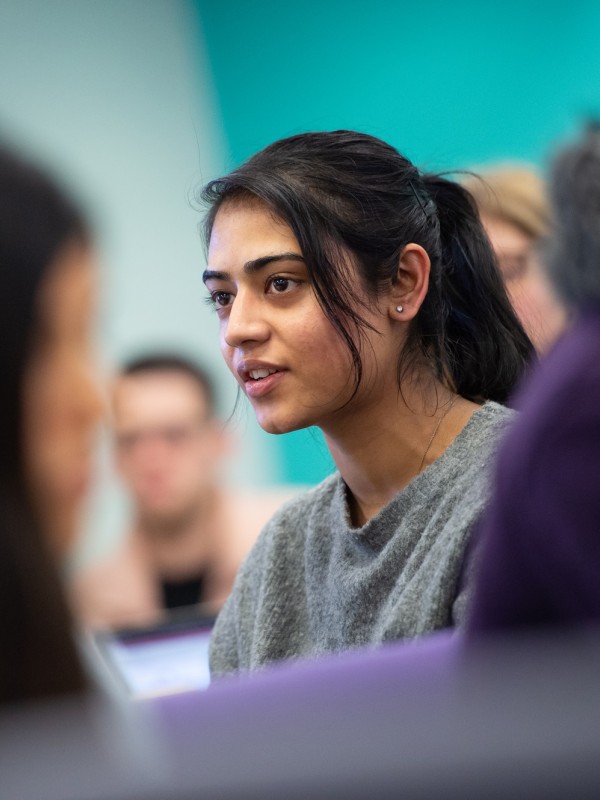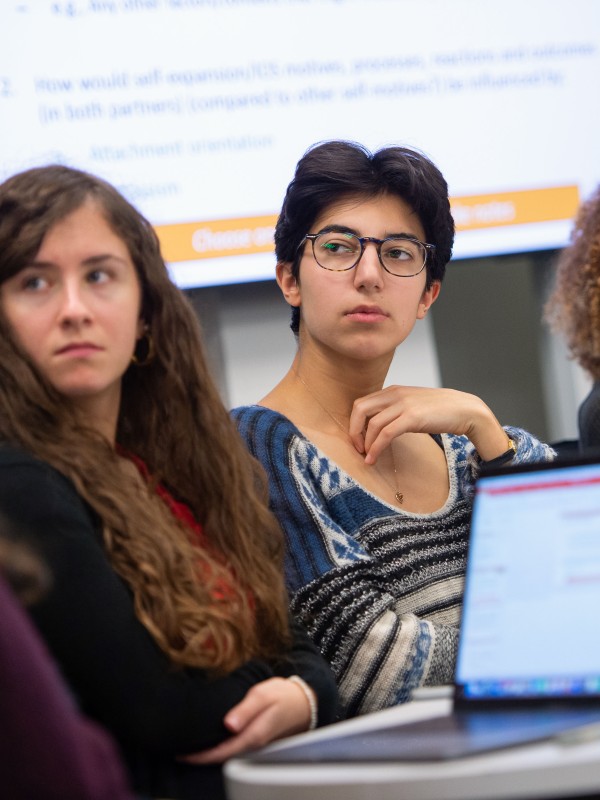
- Psychology (Conversion)
MSc — 2025 entry Psychology (Conversion)
On our Psychology (Conversion) MSc, you'll study a British Psychological Society (BPS) accredited curriculum, designed to challenge the world view of individuals looking for a career change.
Why choose
this course?
- Access our state-of-the-art psychology facilities, including a six-room virtual reality suite and two observation laboratories, and use the latest equipment to conduct experiments.
- Learn from lecturers who are active researchers in key psychological areas such as behavioural, cognitive, developmental, personality and social psychology.
- Study on a course commended by the BPS for the exceptional support provided to students and the way in which research is embedded into the curriculum, through workshops and practical opportunities. You'll get the chance to join one of our research groups and benefit from our links with renowned research institutions across the world.
- Get the experience needed to secure Graduate Basis for Chartered Membership with the BPS, a marker of expertise within the sector.
Statistics
100%
Of our psychology masters graduates are in employment or further study (Graduate Outcomes 2024, HESA)
9th in the UK
Surrey is ranked 9th in the UK for overall student satisfaction (Postgraduate Taught Experience Survey 2023)
12th in the UK
The University of Surrey is ranked 12th in the UK in the Complete University Guide 2025
Accreditation

What you will study
We’ll evolve your knowledge of the theories and practical applications of contemporary psychology, with emphasis on how psychology is applied in practice. You'll learn about the core areas of psychology, including cognitive, developmental and social psychology, the biological bases of psychology and individual differences. You’ll explore the brain, behaviour, personality and psychopathology, building an understanding of the conceptual and historical issues in psychology.
You'll develop the research and statistical skills needed to conduct independent research projects under our expert supervision. You’ll also complete a research dissertation that will allow you to carry out experiments and start or join existing projects on important topics in the field. We’ll match your interests with the expertise of our academic staff, ensuring you get the best support possible. These collaborations have seen previous students’ work being published in top-tier journals.
Professional recognition
MSc - British Psychological Society (BPS)
Accredited against the requirements for the Graduate Basis for Chartered Membership (GBC) of the British Psychological Society (BPS).
Research groups
You’ll be invited to join one of our research groups, where you’ll participate in discussions about research topics, findings and publications, and you’ll benefit from our links with renowned research institutions across the world. We also have a host of external speakers that visit us and present their work, and a collection of seminars and workshops, allowing you to network with like-minded individuals.
The structure of our programmes follows clear educational aims that are tailored to each programme. These are all outlined in the programme specifications which include further details such as the learning outcomes:
Modules
Modules listed are indicative, reflecting the information available at the time of publication. Modules are subject to teaching availability, student demand and/or class size caps.
The University operates a credit framework for all taught programmes based on a 15-credit tariff, meaning all modules are comprised of multiples of 15 credits, up to a maximum of 120 credits.
Course options
Year 1
Semester 1
Core
This module aims to introduce biological psychology and provide the foundation for understanding the biological bases of psychological processes and disorders. In this module we will focus on the organization and function of the human nervous system, from the cells that form the brain and their fundamental functions, the processes by which those communicate, and the systems that allow us to sense and move. We will cover relevant topics in the history of neuroscience and ethics, neuroanatomy, psychopharmacology, neurodevelopment, sensory systems and motor control and the biological causes of brain disorders. Workshops on research methods will provide you with an understanding and hands-on experience with the tools available to measure and modulate brain function and an opportunity to develop teamwork skills. Tutorial sessions will aid your understanding of the theory and allow you to consolidate knowledge by engaging with quizzes and activities.
View full module detailsSocial Psychology investigates how our cognitions (thought processes), affective states (feelings and emotions) and behaviours are related to the social world. This module will introduce you to key concepts, theories, methods, and findings in Social Psychology. The course covers core BPS curriculum in social psychology. Through successful completion of this module, students will develop an understanding of Social Psychological topics including: attitudes and behaviours change, social influence, emotions, prejudice and discrimination of minority groups.
View full module detailsThis module equips students with the skills to design and undertake academic research in psychology, in preparation for developing their own dissertations. The module will cover key aspects of research design, including literature review, forming hypotheses, ethical conduct, and study design and methods, both quantitative and qualitative. Students will propose a study design in a group presentation; implement the study via small-scale data collection and analysis; and present and discuss the findings in an individual research report.
View full module detailsSemester 2
Core
This module teaches you the main theories and empirical evidence in developmental psychology. It also enables you to demonstrate your prior knowledge of Jamovi and statistical techniques gained in first semester and supports you in further modules that require written research reports, such as your dissertation. In this module we will critically evaluate empirical research and theoretical knowledge. One way we will engage in critical evaluation is to examine whether previous work is cross-culturally valid. You will develop your written and numerical communication skills by performing data analysis, writing up a research report, and evaluating a topic in-depth for the exam.
View full module detailsThis module covers the core BPS theme of individual differences: the many and varied psychological ways in which humans differ from one another. Specifically, we will discuss and critically evaluate key issues of contemporary significance in the areas of personality, intelligence and psychopathology, synthesising them all together to form a broader understanding of the concept of individual differences as understood by contemporary psychologists. We will also use these principles to better understand the individual differences present in students’ own lives. Students will write an essay that allows them to apply some of the key individual differences to a real world problem of their choice, and critically evaluate their usefulness in explaining real world issues. This will develop and assess students’ independence, literature searching and critical thinking skills.
View full module detailsThis module will provide an introduction to the major topics and issues within cognitive psychology. This will be done through a series of lectures and research based workshops, which will provide student with an opportunity to integrate their developing knowledge of cognitive psychology with practical skills relating to cognitive research methods.
View full module detailsSemester 1 & 2
Core
It is a requirement of the University that taught postgraduate programmes include a dissertation and/or major project module. For this module students will conduct their own piece of empirical research in an area relevant to their Masters course, under supervision of a member of academic staff. For the assessment students will subject either a qualitative or mixed-method research report of 10,000 words or a quantitative research report of 8,000 words (maximum).Overall student workload: 600 hoursThis includes 12 hours of tutor supervision. These hours will include development of theoretical framework, aims and hypotheses, recruiting samples, fieldwork and liaison with key personnel as appropriate, data recording and analysis, interpretation and writing up. Specific times for these subsections cannot be given as they vary from project to project.
View full module detailsThe module introduces students to basic statistical theory and critical thinking, building throughout the year towards an intermediate level of understanding of statistical analysis and reporting. It aims to develop students¿ understanding of statistical methods and foster the skills needed to think critically about psychological research. Teaching involves a combination of theory lectures and practical workshops with real world research examples. Each week, lectures cover a specific statistics or critical thinking topic. This is followed by a workshop that typically focuses on applying and practicing the theoretical content of the preceding lecture. Together, lectures and workshops provide knowledge of statistical analysis and critical thinking from both a theoretical and practical perspective, resulting in a good introduction and grounding in statistical research methods.
View full module detailsYear 1
Semester 1
Core
This module equips students with the skills to design and undertake academic research in psychology, in preparation for developing their own dissertations. The module will cover key aspects of research design, including literature review, forming hypotheses, ethical conduct, and study design and methods, both quantitative and qualitative. Students will propose a study design in a group presentation; implement the study via small-scale data collection and analysis; and present and discuss the findings in an individual research report.
View full module detailsSocial Psychology investigates how our cognitions (thought processes), affective states (feelings and emotions) and behaviours are related to the social world. This module will introduce you to key concepts, theories, methods, and findings in Social Psychology. The course covers core BPS curriculum in social psychology. Through successful completion of this module, students will develop an understanding of Social Psychological topics including: attitudes and behaviours change, social influence, emotions, prejudice and discrimination of minority groups.
View full module detailsSemester 2
Core
This module teaches you the main theories and empirical evidence in developmental psychology. It also enables you to demonstrate your prior knowledge of Jamovi and statistical techniques gained in first semester and supports you in further modules that require written research reports, such as your dissertation. In this module we will critically evaluate empirical research and theoretical knowledge. One way we will engage in critical evaluation is to examine whether previous work is cross-culturally valid. You will develop your written and numerical communication skills by performing data analysis, writing up a research report, and evaluating a topic in-depth for the exam.
View full module detailsThis module covers the core BPS theme of individual differences: the many and varied psychological ways in which humans differ from one another. Specifically, we will discuss and critically evaluate key issues of contemporary significance in the areas of personality, intelligence and psychopathology, synthesising them all together to form a broader understanding of the concept of individual differences as understood by contemporary psychologists. We will also use these principles to better understand the individual differences present in students’ own lives. Students will write an essay that allows them to apply some of the key individual differences to a real world problem of their choice, and critically evaluate their usefulness in explaining real world issues. This will develop and assess students’ independence, literature searching and critical thinking skills.
View full module detailsYear 2
Semester 1
Core
This module aims to introduce biological psychology and provide the foundation for understanding the biological bases of psychological processes and disorders. In this module we will focus on the organization and function of the human nervous system, from the cells that form the brain and their fundamental functions, the processes by which those communicate, and the systems that allow us to sense and move. We will cover relevant topics in the history of neuroscience and ethics, neuroanatomy, psychopharmacology, neurodevelopment, sensory systems and motor control and the biological causes of brain disorders. Workshops on research methods will provide you with an understanding and hands-on experience with the tools available to measure and modulate brain function and an opportunity to develop teamwork skills. Tutorial sessions will aid your understanding of the theory and allow you to consolidate knowledge by engaging with quizzes and activities.
View full module detailsSemester 2
Core
This module will provide an introduction to the major topics and issues within cognitive psychology. This will be done through a series of lectures and research based workshops, which will provide student with an opportunity to integrate their developing knowledge of cognitive psychology with practical skills relating to cognitive research methods.
View full module detailsSemester 1 & 2
Core
The module introduces students to basic statistical theory and critical thinking, building throughout the year towards an intermediate level of understanding of statistical analysis and reporting. It aims to develop students¿ understanding of statistical methods and foster the skills needed to think critically about psychological research. Teaching involves a combination of theory lectures and practical workshops with real world research examples. Each week, lectures cover a specific statistics or critical thinking topic. This is followed by a workshop that typically focuses on applying and practicing the theoretical content of the preceding lecture. Together, lectures and workshops provide knowledge of statistical analysis and critical thinking from both a theoretical and practical perspective, resulting in a good introduction and grounding in statistical research methods.
View full module detailsIt is a requirement of the University that taught postgraduate programmes include a dissertation and/or major project module. For this module students will conduct their own piece of empirical research in an area relevant to their Masters course, under supervision of a member of academic staff. For the assessment students will subject either a qualitative or mixed-method research report of 10,000 words or a quantitative research report of 8,000 words (maximum).Overall student workload: 600 hoursThis includes 12 hours of tutor supervision. These hours will include development of theoretical framework, aims and hypotheses, recruiting samples, fieldwork and liaison with key personnel as appropriate, data recording and analysis, interpretation and writing up. Specific times for these subsections cannot be given as they vary from project to project.
View full module detailsTeaching and learning
Your teaching will be delivered through a combination of:
- Lectures
- Laboratory-based practicals
- One-to-one supervision
- Online learning
- Seminars
- Tutorials
- Workshops.
Outside of these, you’ll be expected to carry out independent study, including coursework, essays, reading and research.
There may be occasions when the delivery of your teaching is supported by graduate teaching assistants. The University has a set of procedures that govern the use of postgraduate research students in this way.
Teaching staff
You’ll be taught by lecturers who are active researchers, ensuring everything you learn is up-to-date and relevant to employers. These may include:
- Dr Chris Askew, an expert in adult and child psychopathology
- Dr Fabio Fasoli, an expert in social psychology
- Dr Ines Violante, an expert in psychological neuroscience.
General course information
Contact hours
Contact hours can vary across our modules. Full details of the contact hours for each module are available from the University of Surrey's module catalogue. See the modules section for more information.
Timetable
Course timetables are normally available one month before the start of the semester.
New students will receive their personalised timetable in Welcome Week, and in subsequent semesters, two weeks prior to the start of semester.
Please note that while we make every effort to ensure that timetables are as student-friendly as possible, scheduled teaching can take place on any day of the week (Monday – Friday). Wednesday afternoons are normally reserved for sports and cultural activities. Part-time classes are normally scheduled on one or two days per week, details of which can be obtained from Academic Administration.
Location
This course is based at Stag Hill campus. Stag Hill is the University's main campus and where the majority of our courses are taught.
We offer careers information, advice and guidance to all students whilst studying with us, which is extended to our alumni for three years after leaving the University.
100 per cent of our postgraduate psychology graduates go on to employment or further study (Graduate Outcomes 2024, HESA). Our alumni complete additional study to take on roles as clinical psychologists, educational psychologists, occupational psychologists and sport and exercise psychologists, in addition to counsellors and therapists. They work for NHS trusts, healthcare organisations, and charities, amongst others.
The broad and transferrable skills that you’ll develop are also highly relevant in other fields, including advertising, consultancy, human resources, recruitment and teaching. Many of our graduates go on to complete a PhD, investigating an area of personal interest.
Learn more about psychology careers on the BPS website.
Our psychology facilities will give you access to the latest equipment, including a virtual reality suite to simulate real-life scenarios and two observation labs. With our equipment you can conduct experiments using electroencephalography (EEG), transcranial direct current stimulation (tDCS) and transcranial magnetic stimulation (TMS). You can also monitor eye tracking and physiological measures such as earlobe temperature, heart rate and galvanic skin response, both in the lab and remotely, using mobile data loggers.
You’ll also have access to an extensive library of psychometric and clinical tests, 20 bookable project rooms, a breakout space, equipment lockers and a computer lab.
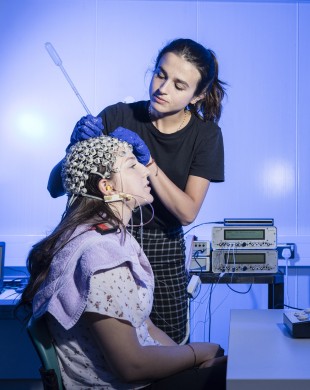
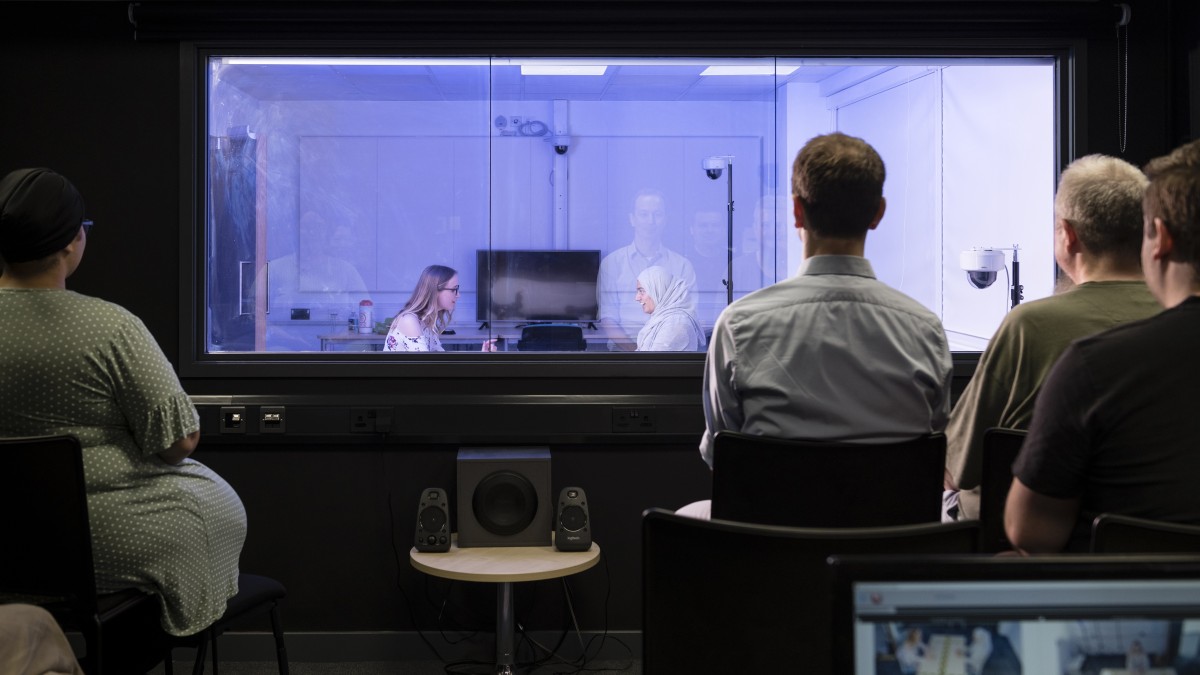


Samantha Buss
Student - Psychology (Conversion) MSc
"What I love about my course is the diverse mix of individuals coming from different fields. This allows for a rich exchange of perspectives and ideas, enhancing the overall learning experience."

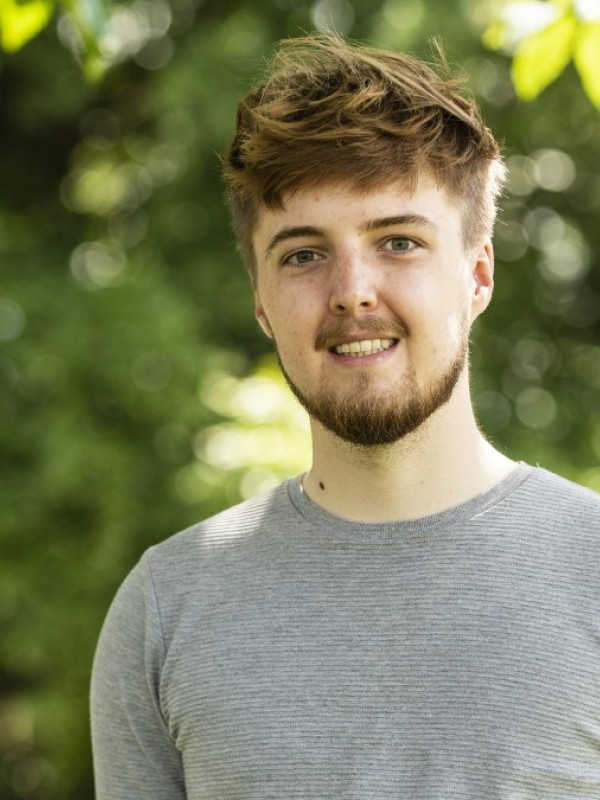
Connor Salter
Student - Psychology (Conversion) MSc
"The lecturers and academics that teach our modules are incredibly knowledgeable in their areas, which often leads to fascinating discussions in lectures, seminars and tutorials."
UK qualifications
A minimum of a 2:1 UK honours degree, or recognised international equivalent, in the following:
- Human resources
- Human sciences
- Medicine
- Natural sciences
- Social sciences
- Social work.
GCSE maths and English (language/literature) C are also required.
Please ensure that you include a personal statement outlining your strengths, weaknesses and motivation. The statement should demonstrate your understanding of psychology as a discipline, detail the areas of psychology that interest you, along with any relevant work experience or skills. You should also demonstrate clearly why this course is a good fit for you, and how you might use the course in your future career. The statement should be no more than two pages in length.
We may be able to take relevant work experience into consideration if you don't meet the typical requirements. If you have at least one year of relevant experience in a full-time graduate-level role (or a minimum of two years’ experience in a relevant graduate-level part-time role) please provide full details of your role and responsibilities in your personal statement and CV when you submit your application. Applications with other degree subjects, or those without relevant GCSEs, may be considered by the Faculty on a case-by-case basis.
This is a regulated course that requires declaration of criminal convictions at the application stage, please visit our criminal convictions web page for more information.
English language requirements
IELTS Academic: 7.0 overall with 6.5 in each component.
These are the English language qualifications and levels that we can accept.
If you do not currently meet the level required for your programme, we offer intensive pre-sessional English language courses, designed to take you to the level of English ability and skill required for your studies here.


International Pre-Masters
Prepare for postgraduate study and boost your career prospects. This is an intensive programme of academic subjects, study skills and English language preparation designed to help you succeed.
Selection process
Applicants will need to submit:
- Copies of academic transcripts and degree certificates showing how you meet the entry requirements
- CV showing previous work experience
- A personal statement outlying your strengths, weaknesses and motivation. The statement should demonstrate your understanding of psychology as a subject, the areas of psychology that interest you, any relevant work experience, and how you wish to use the course in a future career
- Contact details of two references (preferably including at least one academic reference).
Recognition of prior learning
We recognise that many students enter their course with valuable knowledge and skills developed through a range of ways.
If this applies to you, the recognition of prior learning process may mean you can join a course without the formal entry requirements, or at a point appropriate to your previous learning and experience.
There are restrictions for some courses and fees may be payable for certain claims. Please contact the Admissions team with any queries.
Scholarships and bursaries
Discover what scholarships and bursaries are available to support your studies.
Fees per year
Explore UKCISA’s website for more information if you are unsure whether you are a UK or overseas student. View the list of fees for all postgraduate courses.
September 2025 - Full-time - 1 year
- UK
- £12,400
- Overseas
- £24,900
September 2025 - Part-time - 2 years
- UK
- £6,200
- Overseas
- £12,500
- These fees apply to students commencing study in the academic year 2025-26 only. Fees for new starters are reviewed annually.
Payment schedule
- Students with Tuition Fee Loan: the Student Loans Company pay fees in line with their schedule (students on an unstructured self-paced part-time course are not eligible for a Tuition Fee Loan).
- Students without a Tuition Fee Loan: pay their fees either in full at the beginning of the programme or in two instalments as follows:
- 50% payable 10 days after the invoice date (expected to be October/November of each academic year)
- 50% in January of the same academic year.
- Students on part-time programmes where fees are paid on a modular basis: cannot pay fees by instalment.
- Sponsored students: must provide us with valid sponsorship information that covers the period of study.
The exact date(s) will be on invoices.
Additional costs
- General programme related costs such as study materials
- Potential costs involved in conducting independent learning remotely e.g. internet connection etc.
Funding
You may be able to borrow money to help pay your tuition fees and support you with your living costs. Find out more about postgraduate student finance.
Apply online
To apply online first select the course you'd like to apply for then log in.
Select your course
Choose the course option you wish to apply for.
Sign in
Create an account and sign into our application portal.
Please note that we may have to close applications before the stated deadline if we receive a high volume of suitable applications. We advise you to submit your application as soon as it is ready.
ApplyPlease note that we may have to close applications before the stated deadline if we receive a high volume of suitable applications. We advise you to submit your application as soon as it is ready.
ApplyAdmissions information
Once you apply, you can expect to hear back from us within 14 days. This might be with a decision on your application or with a request for further information.
Our code of practice for postgraduate admissions policy explains how the Admissions team considers applications and admits students. Read our postgraduate applicant guidance for more information on applying.
About the University of Surrey
Need more information?
Contact our Admissions team or talk to a current University of Surrey student online.
Terms and conditions
When you accept an offer to study at the University of Surrey, you are agreeing to follow our policies and procedures, student regulations, and terms and conditions.
We provide these terms and conditions in two stages:
- First when we make an offer.
- Second when students accept their offer and register to study with us (registration terms and conditions will vary depending on your course and academic year).
View our generic registration terms and conditions (PDF) for the 2024/25 academic year, as a guide on what to expect.
Disclaimer
This online prospectus has been published in advance of the academic year to which it applies.
Whilst we have done everything possible to ensure this information is accurate, some changes may happen between publishing and the start of the course.
It is important to check this website for any updates before you apply for a course with us. Read our full disclaimer.





